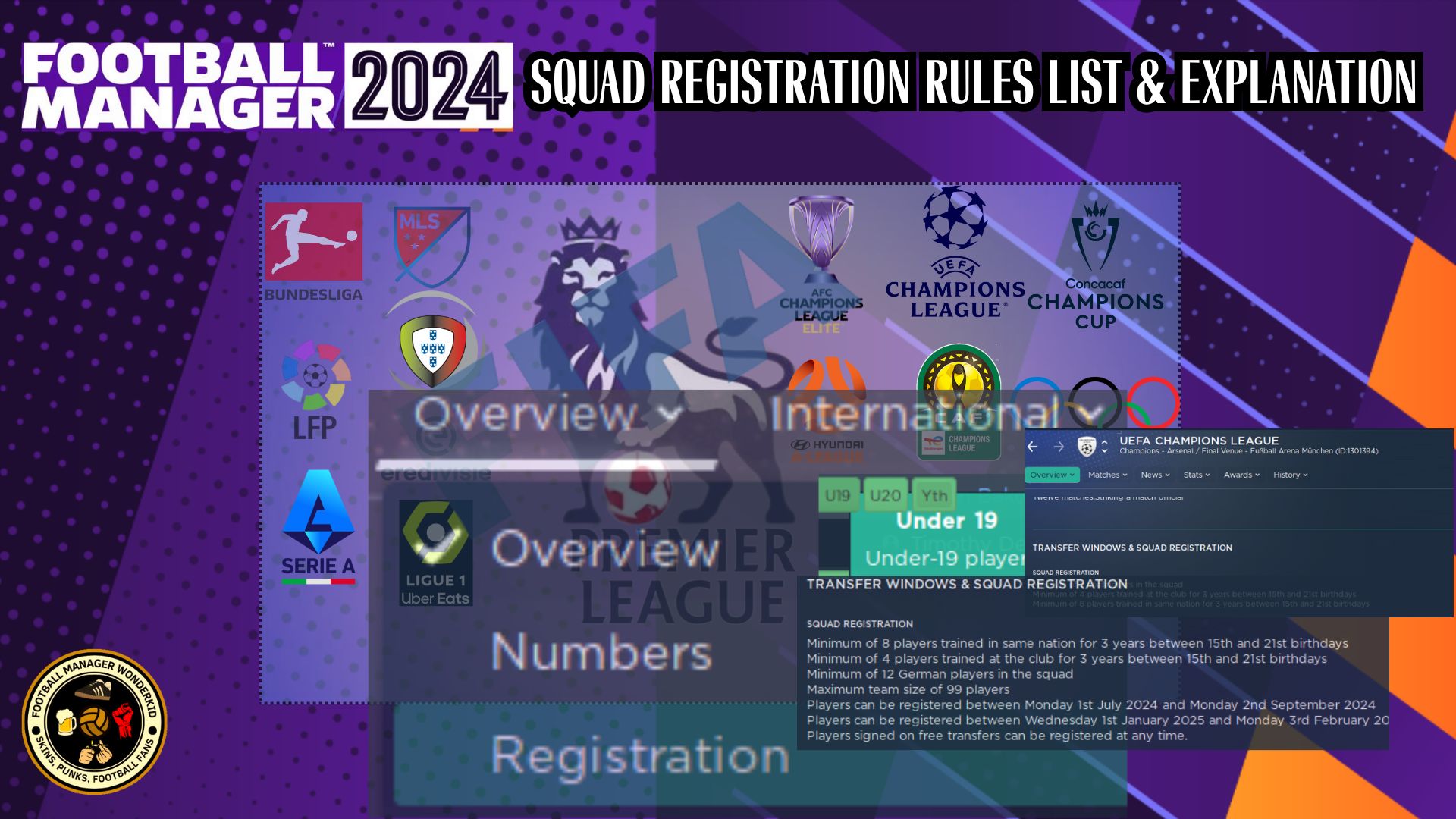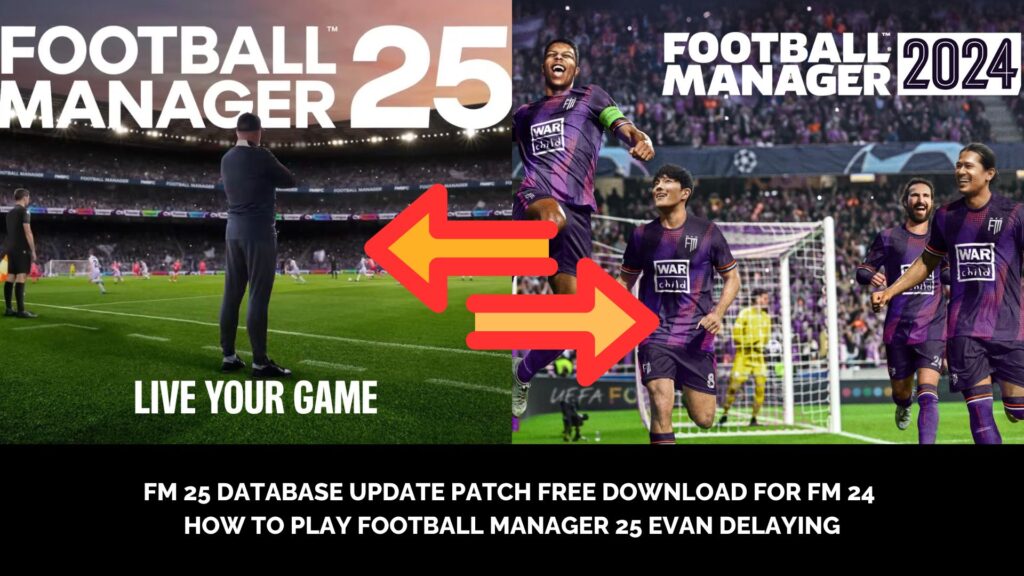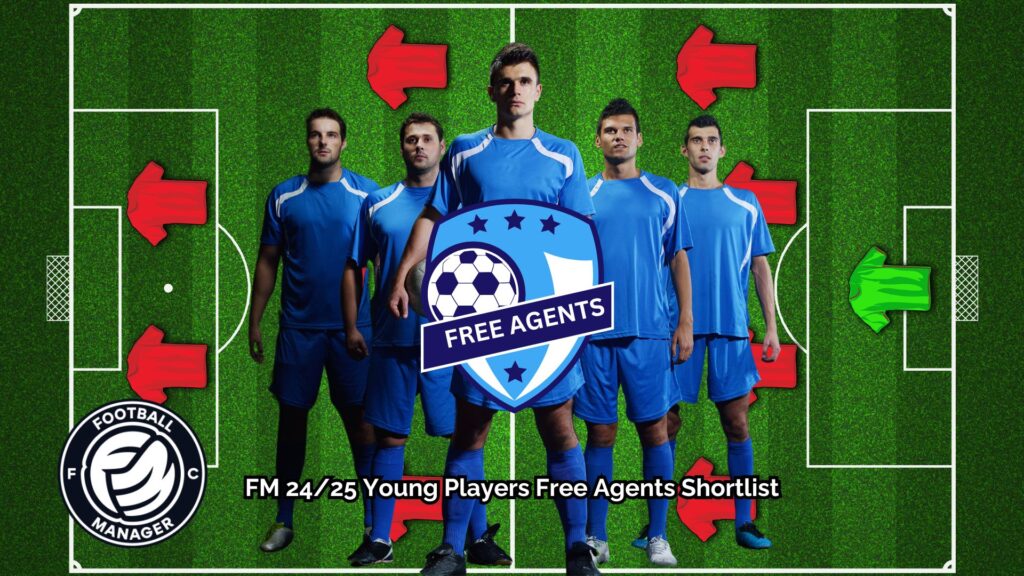It’s not just picking your best players, is it? Rules, rules, rules. Every league’s got ’em, and they trip you up if you ain’t paying attention. You sign that brilliant striker, then realize you can’t even play him ’cause you got too many foreigners. Annoying?
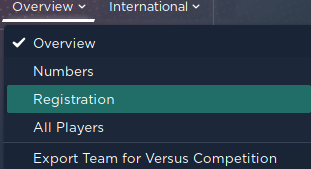

Yeah, happens all the time. But knowing the rules saves you headaches. Lets you build a team that can play together. It’s a big part of planning your season, maybe even your whole save, yeah?
Here’s the quick rundown, the stuff you gotta know fast.
| Key Takeaways: Football Manager Squad Registration Rules |
|---|
| Major European leagues (England, Spain, Italy, Germany, France, Portugal, Netherlands) often limit senior squads to 25 players over 21. |
| Homegrown player rules (club-trained or nation-trained) are a common requirement in European leagues. |
| Limits on non-EU or foreign players vary significantly across different leagues and continents. |
| Leagues in South America, Africa, Asia, and Oceania have diverse registration rules, sometimes including regional rules or unique foreigner definitions. |
| Players below a certain age (typically U21 or U19) are often exempt from senior squad registration lists. |
| Missing a registration deadline means players cannot participate in the specific competition until the next window. |
| Utilising the FM24 Squad Planner helps in building a squad that complies with registration limits. |
| Some registration rules are highly specific or can be quite challenging to navigate in the game. |
| The in-game UI Football Manager 2024 Squad Registration UI) provides a clear overview of rules and current squad status. |
Understanding the Basics of Football Manager Squad Registration
Note: While the Premier League doesn’t have a non-EU registration limit within the 25, work permit rules still apply for non-UK players, which acts as a different kind of restriction.
This table gives you the main points. Remember to always check the exact rules in your save game, as they can sometimes have small variations or updates, especially with FM 24/25 Season Transfer Data Update Patch or database changes (FM 25 Database Update).
But this covers the big stuff for these leagues.
Click to find out more ↓↓↓
So, what’s the deal with squad registration? It’s the game’s way of making you follow real-world football rules about who can play in a competition. You got your main squad, right? But for the league, for the Champions League, Europa League, whatever, you gotta pick a specific list of players. Only guys on that list can play in those games. Simple as.
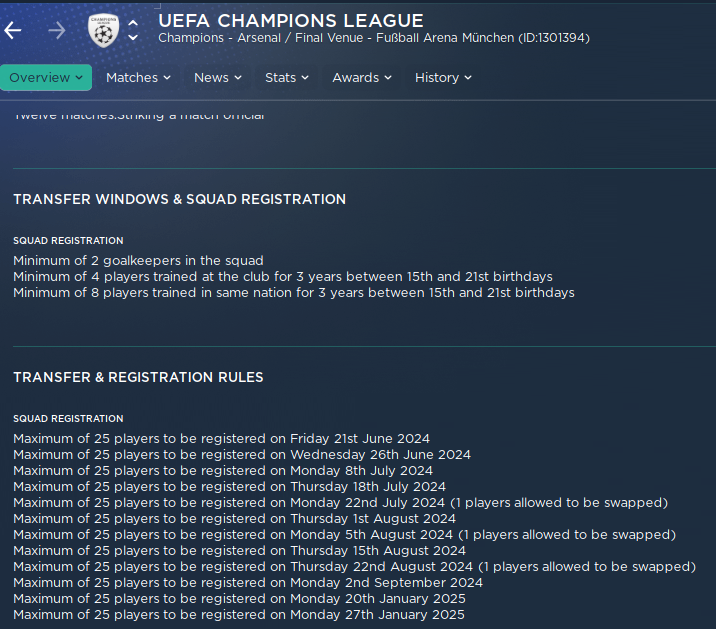
It means you can’t just sign everyone good you see. You have limited spots, usually. How many spots? Depends on the competition. Who counts towards the limit? Usually players over a certain age, like 21. Does this make things hard? Course it does! You gotta make choices.
Why do they even have this? Real football clubs do it. Leagues want to control squad sizes, encourage local talent, and maybe limit too many foreign players. The game puts it in to make it feel authentic.
You’re not just playing FIFA with spreadsheets; you’re managing a club with actual rules. It adds strategy. You can’t just stockpile players. You need to balance your squad, and think about age, nationality, and who you can actually register. It stops you from just buying up all the best players and makes squad building a proper puzzle. It’s a fundamental part of how Football Manager works, yeah.
European Giants: Registration Rules in England 🇬🇧, Germany 🇩🇪, Italy 🇮🇹, Spain 🇪🇸, France 🇫🇷, Netherlands 🇳🇱, Portugal 🇵🇹
| England (Premier League) | Max 25 | Min 8 ‘Homegrown’ (Trained in ENG/WAL before 21) | No specific non-EU limit within 25* | Players U21 (on Jan 1st of season start year) don’t need registration |
| Germany (Bundesliga) | No fixed limit | Min 12 ‘German’ players; Min 8 ‘Homegrown’ (4 club-trained, 4 nation-trained) | No non-EU limit | Players U23 (on July 1st of season start year) don’t need registration |
| Italy (Serie A) | Max 25 | Min 8 ‘Homegrown’ (4 club-trained, 4 nation-trained) | Limit on new non-EU signings per season (often 1 or 2 depending on sales) | Players U22 (on Jan 1st of season start year) don’t need registration |
| Spain (La Liga) | Max 25 | Min 8 ‘Homegrown’ (Trained in Spain before 21) | Max 3 Non-EU players in match squad | Players U23 (on start of season) don’t need registration |
| France (Ligue 1) | Max 25 | Min 8 ‘Homegrown’ (Trained in France before 21) | Max 4 Non-EU players | Players U21 (on Jan 1st of season start year) don’t need registration |
| Holland (Eredivisie) | No fixed limit | No specific homegrown quota, but rules on minimum Dutch players in match squad | No specific non-EU limit | Players U21 (on July 1st of season start year) don’t need registration |
| Portugal (Primeira Liga) | Max 25 | Min 10 ‘Homegrown’ (4 club-trained, 6 nation-trained) | No specific non-EU limit | Players U21 (on Jan 1st of season start year) don’t need registration |
Continental Challenges: UEFA Champions/Europa/Conference League and Copa Libertadores Rules
| Competition(s) | Senior List Limit / Overall Squad Size | Homegrown/Specific Player Rules | Foreigner/Nationality Rules | Youth/Other Lists |
|---|---|---|---|---|
| UEFA Champions/Europa/Conference League | ‘A List’: Max 25 (players over 21). | Quotas: ‘Club-trained’ (4 players, 3 yrs at club 15-21), ‘Association-trained’ (4 players, 3 yrs in nation’s clubs 15-21). List size reduces if quotas not met. | Not specified for registration list size. | ‘B List’: For U21/U19 players (at club few years, usually 2-3). Don’t count vs ‘A List’ limit. No limit on ‘B List’. |
| CONMEBOL Copa Libertadores | Initial List: Large (often 40-50). | Not typically a major focus in the rules compared to nationality. | Limits on foreign players, the definition varies (e.g., non-North American, non-domestic league). Applies to list or matchday. | Not a standard feature like UEFA’s ‘B List’. |
| CONCACAF Champions Cup | Overall List: Limited (often 30-40). | Less emphasis compared to UEFA. Sometimes rules about domestic league players vs. foreign players. | Limits on foreign players, definition varies (e.g., non-North American, non-domestic league). Applies to list or matchday. | Younger players often don’t need registration below a certain age. |
| CAF Champions League / Confederation Cup | Overall List: Limited (often 30-40). | Not typically a major focus. | Strict limits on foreign players (often 3-5) often applied to the matchday squad. | Younger players often don’t need registration below a certain age. |
| AFC Champions League / AFC Cup | Overall List: Limited (often around 30). | Not typically a major focus. | Specific quotas like “3+1” (3 non-AFC + 1 AFC foreigner) common for matchday squad or registered list. | Younger players often don’t need registration below a certain age. |
| OFC Champions League | Overall List: Limited (often 25). | Not typically a major focus. | Strict limits on foreign players common, often applying to the registered list. | Younger players often don’t need registration below a certain age. |
Find out more: UEFA Champions League New Format
Registration Windows and Player Availability

Registration isn’t a one-time thing. It happens at specific points in the season. The main one is usually before the season starts. You submit your squad list then. Then, typically, you get another chance to change your list after the mid-season transfer window closes, often in January.
These are the only times you can add or remove players from your registered list for the competition. What if you sign a player outside these windows? Say, a FM Free Agents in March? You can sign them, they can train, but they cannot play in the registered competition until the next window opens. This is why player availability is so tied to registration.
Click to find out more ↓↓↓
This makes the transfer windows even more critical. You gotta get your business done and make your registration choices before the deadline. Signing a player late in the middle of the season is great, but if you forget to register them, they sit there until next season’s registration opens. It’s a mistake you only make once, trust me. Always double-check that registration screen before the deadline passes.
Youth, Homegrown, and the Future
Rules often give a pass to young players. This is a lifesaver in Football Manager. Players under a certain age, usually 21 or sometimes even 19 depending on the league, don’t need to be included in the senior registered squad. They can play freely without taking up a spot on the main list. This is perfect for developing FM Wonderkids.
You can sign talented youngsters, give them game time, and they don’t cost you a senior registration slot. It means you can have a large pool of youth players pushing for the first team without hitting registration limits. Does this make youth development important? Absolutely!
But here’s the catch. Once these young players pass the age limit, they suddenly do need to be registered in the senior squad if you want them to keep playing. This is where planning ahead comes in. You know your best 20-year-old will turn 21 next year; you need to make sure you have a spot for him on the 25-man list. This ties into homegrown rules too.
Many leagues require a minimum number of players who were trained at your club or in the nation. These players often need to be registered in the senior squad and count towards that specific quota. So, developing homegrown talent isn’t just sentimental; it’s a practical necessity for meeting registration rules and keeping spots open for foreign signings. It influences who you sign for your youth teams and how you manage their development.
Registration Rules Beyond Europe: South America, Africa, Asia, Oceania

It ain’t just Europe with rules, oh no. Leagues all over the world got their own systems, and they can be very different. In South America, for example, many leagues have strict limits on foreign players – often only three or five can be in the matchday squad, not just registered.
And sometimes, rules vary by state or region within a country, not just the national league. Brazil’s state championships before the main league season? They have their own registration rules, completely separate. This adds layers of complexity you don’t see in Europe. You might have a player registered for the state league but not the national league, or vice versa.
Asian leagues often have specific quotas too. You might see rules like “3+1”, meaning three foreign players of any nationality plus one player from an AFC (Asian Football Confederation) nation. Or different rules for players from specific countries.
African leagues also have foreigner limits. Oceania leagues, like Australia’s A-League, have salary cap rules and squad registration limits combined, making it a different kind of puzzle. These rules reflect local football structures and priorities. They mean scouting and signing players in these regions requires understanding a whole new set of constraints compared to Europe.
You can’t just apply European thinking; you need to learn the local registration landscape. It forces you to adapt your strategy significantly depending on where you manage.
The Quirky and Difficult Rules
Some registration rules in Football Manager are just plain weird or make life really hard. Ever tried managing in Argentina? The rules there can be famously complicated, sometimes involving multiple registration lists, specific deadlines that feel random, and homegrown rules that are tough to track.
Or managing in leagues with financial fair play rules tied into squad registration, where you can’t register players if your wage bill is too high. That’s a double headache. What about leagues where players from certain neighboring countries don’t count as foreigners, but players from slightly further away do? It gets specific.
One rule that catches people out is when a competition (like a specific cup) has different registration rules or deadlines than the main league. You register your squad for the league, think you’re done, then find out you needed a separate list for the domestic cup, and you missed the deadline.
Or rules about registering B-team players for the first team – sometimes there are limits on how many, or specific age criteria, or they have to be registered on the main list if they play too many games. These specific rules, often buried in the competition rules screen, are the ones that can really mess up your plans if you don’t spot them early. They make you check everything, not just the obvious league rules.
Checking Your Status: Using the Football Manager 2024 Squad Registration UI
Alright, how do you keep track of all this? The game gives you the tools. There’s a specific part of the interface just for registration. You usually find it under the ‘Squad’ section, maybe a button or tab called ‘Registration’ or similar. When you click it, you’ll see a list of competitions your team is in that require registration. Click on a competition, and bam, there are the rules.
The Football Manager 2024 Squad Registration UI image shows what this looks like. It lists your players and tells you if they’re registered or not. It also usually shows you how many spots you have left, how many homegrown players you need, and any other limits you’re facing.
The UI is interactive. You can often tick boxes next to players to add or remove them from the list (though remember you can only do this during registration windows).
The game highlights problems, like if you’ve selected too many players or not enough of a certain type. It’s your dashboard for registration. You must use this screen. Before the season, after transfer windows, anytime you sign a new player you want to play competitively.
Get used to looking at it. It saves you from making silly mistakes like forgetting to register your star striker or signing a player you can’t use. It’s the game telling you, “Here are the rules, are you following them?” Pay attention to the warnings it gives you.
Squad Registration Rules FAQ
Q: Do friendlies require squad registration?
A: No, friendly matches usually do not require players to be registered for a specific competition list.
Q: Can I register a player who is injured long-term?
A: Yes, injured players still count towards your registration limit and must be registered if you want them available when they return to fitness (and within a registration window).
Q: What is a “B” list player?
A: Some competitions (like UEFA cups) have a “B” list for younger, often homegrown players, who don’t count towards the main “A” list limit, provided they meet specific age and training criteria.
Q: If I sell a registered player, does that free up a spot immediately?
A: Yes, if you sell a player from your registered list, that spot becomes free. However, you can usually only fill that spot by registering a new player during an open registration window.
Q: How do I know if a player is homegrown for a specific league?
A: Scouting Report will tell you how the player counts. The game’s registration UI will also tell you if a player qualifies as homegrown for that competition’s rules.
Q: Are loan players registered differently?
A: Loan players usually need to be registered just like permanent signings, and they count towards squad limits and foreigner rules, unless the specific loan terms or league rules state otherwise.
Football Manager Squad Registration Rules – Content:

